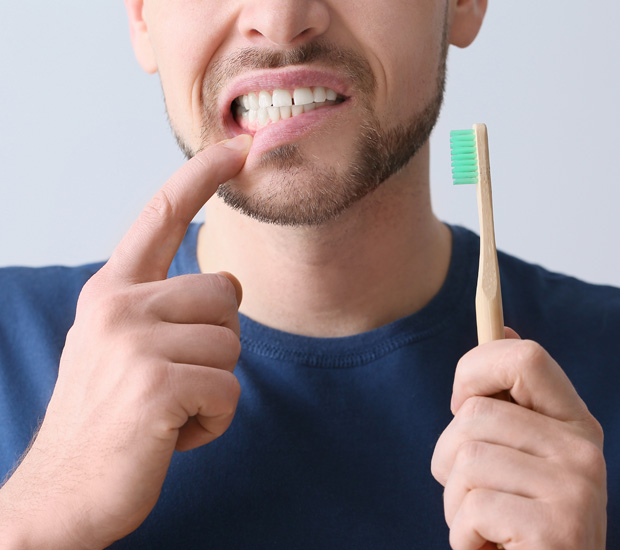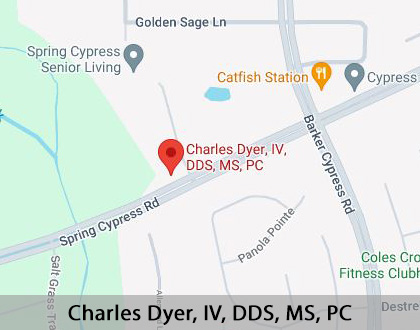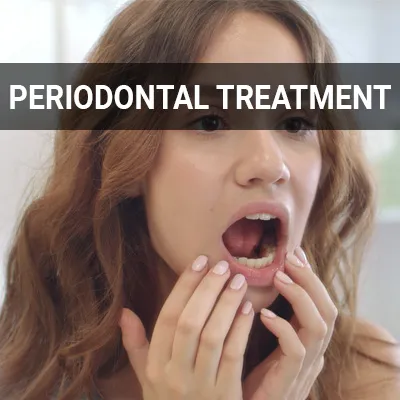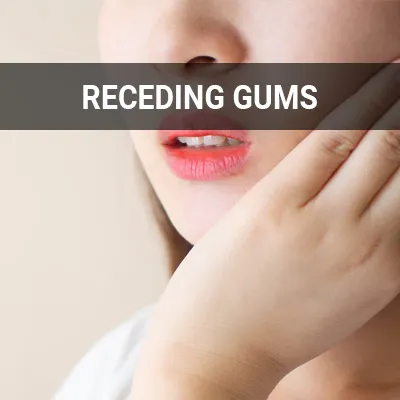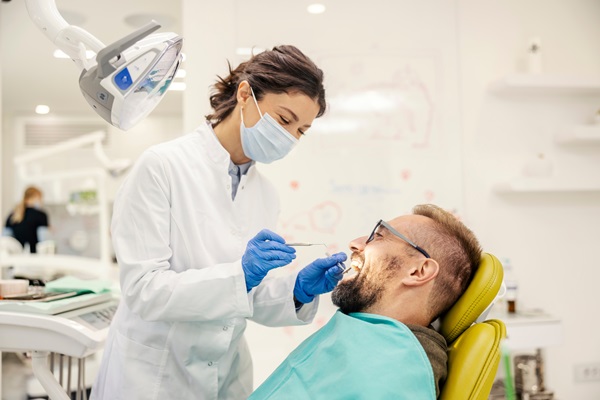Gum Medication Cypress, TX
Several recommended gum medications can be effective on their own or in conjunction with other treatments to reduce or eliminate the bacteria responsible for gum disease. They range from over-the-counter toothpaste and mouth rinses to topical antibiotics. The type of gum medication you receive depends on the stage of the gum disease, how you responded to previous treatments, and your overall health.
Gum medication is available at Charles E. Dyer IV, DDS, MS, PC in Cypress and the surrounding area. If you are suffering from inflamed or swollen gums, call us at (281) 213-0900 to learn more or schedule an appointment.
Gum Medication 101
Gum medication helps treat minor cases of gingivitis and more advanced cases of gum disease. The most common medications are over-the-counter and prescription toothpaste or rinses that contain antibacterial or anti-plaque agents. Certain mouth rinses can help kill bacteria and prevent plaque buildup. Prescription topical and oral antibiotics can also treat more severe cases of periodontal disease.
Antibiotics, such as amoxicillin and azithromycin, have treated a wide array of bacterial infections for decades. Other gum medications, such as chlorhexidine, are considered antimicrobials. It first got recognized as an effective oral agent in the 1970s. These medications are still used today.
“Gum medication helps treat minor cases of gingivitis and more advanced cases of gum disease.”
Conditions Requiring Gum Medication
Gum medications typically treat gingivitis, a common and mild form of gum disease, and more severe periodontal or gum disease forms. Signs and symptoms of gingivitis include swollen or irritated gums or gums that bleed. In its more serious condition, periodontitis, the gums can pull away from the tooth, bone can be lost, and the teeth may loosen or even fall out.
Gingivitis often gets treated first with special kinds of toothpaste or antimicrobial mouthwashes prescribed or purchased over-the-counter. These treatment options contain potent antibacterial agents that significantly prevent or reduce gingivitis. In addition, we may also recommend hydrogen peroxide products to help prevent or treat gingivitis.
Topical or oral antibiotics are typically reserved for more severe cases of gum disease. Topical gum medication releases antibiotics over time directly into the tooth and gum tissue to control bacteria growth. Oral antibiotics are also effective but come with the potential for side effects.
“Topical gum medication releases antibiotics over time directly into the tooth and gum tissue to control bacteria growth.”
Types of Gum Medications
We may prescribe a patient one of several different types of gum medications to treat their condition. These include:
- Tetracycline: An antibiotic used to fight bacteria; it includes antibacterial properties which help reduce inflammation
- Azithromycin: An antibiotic known to reduce bacterial growth associated with gum disease
- Metronidazole: An antibiotic often prescribed to patients with severe gum disease
- Amoxicillin: Antibiotic used to fight bacteria and bacterial infections
- Chlorhexidine: An antimicrobial used to control plaque and gingivitis available as a mouth rinse
- Stannous fluoride: An antibacterial agent that significantly prevents or reduces gingivitis
The most common antibiotics used for gum infections are tetracycline, amoxicillin, metronidazole, or azithromycin. Most only get used for severe cases because of the potential for side effects. Antibiotics prescribed for gingivitis are typically used topically after a deep cleaning procedure. Prescription toothpaste and mouthwashes that include chlorhexidine and stannous fluoride are often recommended to treat less severe forms of gingivitis.
A condition called acute necrotizing ulcerative gingivitis, or trench mouth, represents a rare but serious form of gum disease often treated with the antibiotics metronidazole or amoxicillin. Mouthwashes containing chlorhexidine or hydrogen peroxide may also be prescribed.
“Antibiotics prescribed for gingivitis are typically used topically after a deep cleaning procedure.”
Check out what others are saying about our dental services on Yelp: Gum Medication in Cypress, TX
The Benefits of Gum Medication
Gum medications are designed to treat the various symptoms associated with gum conditions. Prescription toothpaste and mouthwashes contain agents that can effectively fight off bacteria, inhibit plaque formation, and relieve pain and swelling of the gums. This type of gum medication is often combined with other treatment therapies to produce the best outcome.
Topical antibiotics can come as gels, chips, strips, or mini-capsules placed directly on the teeth, gums, or under the gums. This gum medication releases antibiotics slowly to control bacteria growth and reduce pocket depth. The greatest advantage of using topical antibiotics is that they target specific areas and leave the rest of the mouth alone.
“The greatest advantage of using topical antibiotics is that they target specific areas and leave the rest of the mouth alone.”
Questions Answered on This Page
Q. What conditions require gum medication?
Q. What types of gum medications are there? What medications get prescribed for certain gum conditions?
Q. What are the benefits of gum medication?
Q. What are the potential risks of gum medication?
People Also Ask
Q. What can an oral cancer screening reveal?
Q. What conditions can be treated by oral surgery?
Q. Why would I need a periodontist?
Potential Risks
Before beginning any treatment, patients should inform our staff about any health conditions they may have and any medications and supplements they are currently taking. That will help with any treatment decisions and possible side effects, including allergies. Allergic reactions are likely in both topical and oral antibiotics and can be severe.
Side effects from gum medication can range from irritation of the mouth to common cold-like symptoms. Patients with weak immune systems due to diabetes, HIV infection, or cancer or radiation treatments may be more susceptible to these side effects. Other types of antibiotics or supplements may also counteract the effects of gum medication. Our staff will evaluate patients' medical histories to help determine the right course of treatment.
“Before beginning any treatment, patients should inform our staff about any health conditions they may have and any medications and supplements they are currently taking.”
Frequently Asked Questions
Q. What gum medications are used to treat disease?
A. Antibiotics, either oral or topical, can get combined with other therapies to treat gum disease. Antibiotics reduce or temporarily kill the bacteria responsible for gum inflammation. Nonprescription toothpaste and mouthwashes can also get recommended to reduce plaque and gingivitis.
Q. What is chlorhexidine?
A. Chlorhexidine is a gum medication used to control plaque and inflammation in the mouth or pockets between the gums and teeth. It is available as a mouthwash or a type of chip that gets placed in the gum pockets after treatment procedures. When used in this way, the medication is slowly released over about a week.
Q. What are the possible side effects of gum medication?
A. The side effects will vary depending on the type of gum medication. Most medications have minor and rare side effects. The most common ones include mouth irritation, dry mouth, unusual taste for toothpaste and mouthwashes, flu symptoms, and topical antibiotics headaches.
Q. What are the most common antibiotics for gum disease?
A. The most common antibiotic gum medicines are tetracyclines, amoxicillin, and azithromycin. Their oral form is typically reserved for severe infections, while the antibiotic forms also have a topical use.
Q. What other medications counteract or interfere with gum medications?
A. Blood pressure and blood thinner medications should not be used in conjunction with gum medications. Other medications that may interfere with gum medication include antidepressants, antihistamines, pain relievers, antacids, and decongestants. However, all medications are different and require different dosages for each patient. It is important to communicate with both your doctor and dentist before taking any new medications to assess whether they will have any effect when taken together.
Start Feeling Better – Visit Us Today
By visiting us as soon as possible, our team can help get you the professional treatment you need. Instead of waiting around and allowing the symptoms to get worse, we can provide you with treatment options.
Definitions
Learn More About Gum Medication
Whether purchased over-the-counter or prescribed, gum medications can help improve your oral health and reduce your risk for more serious complications. Let our staff help you achieve a mouth that is healthy and free of pain. Call Charles E. Dyer IV, DDS, MS, PC at (281) 213-0900 to schedule an appointment.
Helpful Related Links
- American Academy of Periodontology (AAP). American Academy of Periodontology (AAP). 2023
- Center for Disease Control and Prevention (CDC), Periodontal Disease Page. Center for Disease Control and Prevention (CDC), Periodontal Disease Page. 2023
- WebMD, What Is a Periodontist?. WebMD, What Is a Periodontist?. 2023
About our business, license, and website security
- Charles E. Dyer IV, DDS, MS, PC was established in 2007.
- We accept the following payment methods: American Express, Cash, Check, Discover, MasterCard, and Visa
- We serve patients from the following counties: Harris County, Washington County, and Waller County
- We serve patients from the following cities: Cypress, Houston, Katy, Spring, The Woodlands, Brenham, Waller, Sugar Land, Jersey Village, and Hempstead
- TX (License #21174). View License Information and Specifics
- National Provider Identifier Database (1285771352). View NPI Registry Information
- Healthgrades. View Background Information and Reviews
- Norton Safe Web. View Details
- Trend Micro Site Safety Center. View Details
Back to top of Gum Medication
